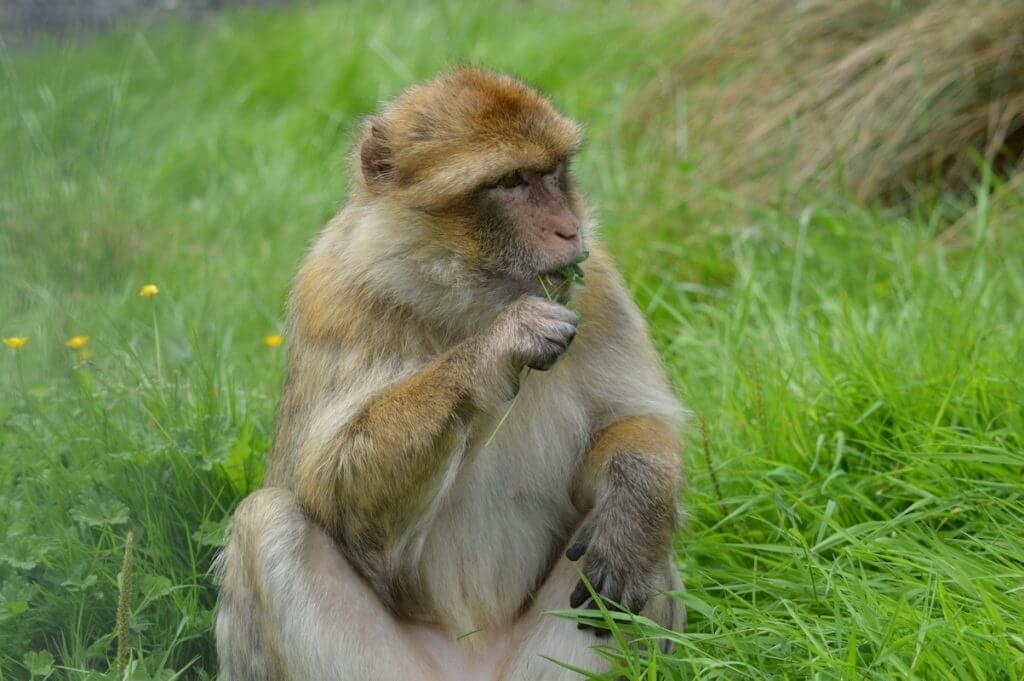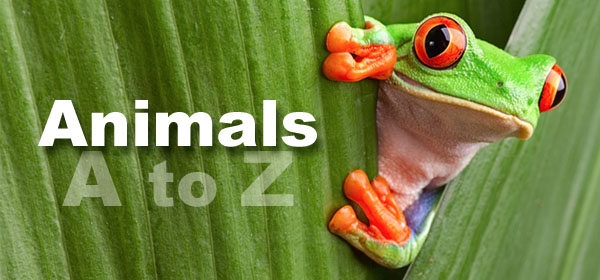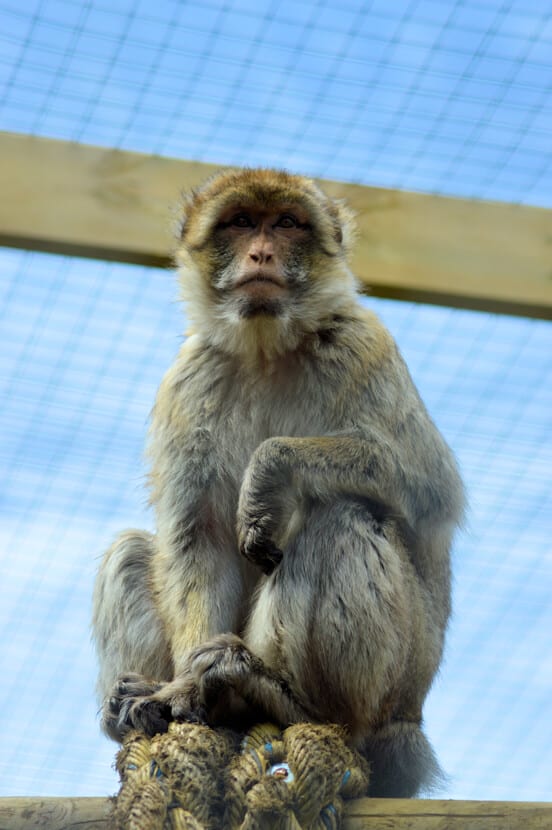 There are over 20 different species of macaques (Macaca) and here at Wingham Wildlife Park, we have one of these – Barbary macaques (Macaca sylvanus). As we kick off International Macaque Week, I wanted to take this opportunity to introduce you to this wonderful, fascinating and charismatic species!
There are over 20 different species of macaques (Macaca) and here at Wingham Wildlife Park, we have one of these – Barbary macaques (Macaca sylvanus). As we kick off International Macaque Week, I wanted to take this opportunity to introduce you to this wonderful, fascinating and charismatic species!
Barbary macaques are classified as endangered on the IUCN redlist with wild population estimates ranging from 8,000 – 15,000 individuals. However, their numbers are decreasing, with estimates suggesting their numbers have declined by 50% over the last 24yrs. The wild populations are also becoming severely fragmented (more on that later).
They are unique in that they are the only African primate to live north of the Sahara desert – where they can be found in isolated fragments of the Middle and High Atlas mountains of Morocco and Algeria. They are also the only species of primate to occur in Europe, in the form of an introduced population in Gibraltar.
BARBARY MACAQUE FACTS:
- A highly adaptable species capable of living in a range of environments from high altitude forests to gorges, montane areas and even coastal scrubland. However, their core and optimal habitat is cedar and oak forest.
- In the wild, Barbary macaques eat leaves and fruits and have also been seen eating invertebrates.
- In the winter, much of their habitat is covered in snow. As such, Barbary macaques owe much of their survival during this season to cedar trees, which provide almost all their food.
- They are social animals, living in groups of up to 80 individuals, although the average is around 40.
- Barbary macaques have a strict hierarchy within their groups with males more dominant. Female position in group is highly dependent on their Mother’s position in the group.
- Their life span is anywhere between 22 – 30 years.
- Their main predators are humans, wolves and domestic dogs.
- Sometimes mistaken as apes, Barbary macaques are in fact monkeys with vestigial tails.
BARBARY MACAQUES IN GIBRALTAR
Gibraltar is home to a semi-wild group of Barbary macaques, who are considered to be one of Gibraltar’s top tourist attractions. The exact origin of this population is unclear but it is most likely that they are descended from an introduced population, brought over from North Africa. Nobody can be 100% sure when they arrived, but the first written record of Barbary macaques on Gibraltar date from 1704.
During the second world war, Sir Winston Churchill took a personal interest in the Gibraltar macaque population. Legend dictates that whilst the Barbary macaques remain on Gibraltar, the territory will remain under British rule. So when their numbers began to decline in 1942 (the height of World War II), Churchill ordered that the Gibraltar population be replenished with macaques from North Africa.
Tourists flock to see the Barbary macaques who are so used to human contact that they climb all over them, searching for food. Barbary macaques are also smart and have learnt to unzip bags in the hope of finding a tasty morsel inside! Such is the extent of the problem that it is now illegal to feed the macaques and hefty fines are imposed for anyone caught doing so.
The macaques are now managed by the Gibraltar Ornithological and Natural History Society (GONHS) and are under veterinary supervision.
THREATS TO BARBARY MACAQUES
As previously mentioned, Barbary macaques are unfortunately endangered and face a number of threats in the wild. A few of the main issues are listed below:
Habitat loss
This is widely considered to be the most serious threat faced by Barbary macaques and indeed many other threatened species on the planet.
The forest habitat of Barbary macaques is being lost, fragmented and degraded by humans. There are two main reasons for this:
- Agricultural use – woodland is cleared so that local people can graze their cattle or plant their crops.
- Logging – forests are cut down on a domestic or industrial scale for timber.
The main issue with habitat loss is that it causes habitat fragmentation. If a habitat becomes fragmented, it means that populations become increasingly isolated from each other. This in turn means that migration between these sub-populations is no longer possible. As a consequence, the flow of genes is then prevented and/or limited – which is a bad thing as it means that genetic diversity is lost. For a species to survive it is essential that the population has a healthy genetic diversity as it is this that helps populations to adapt to changing environments.
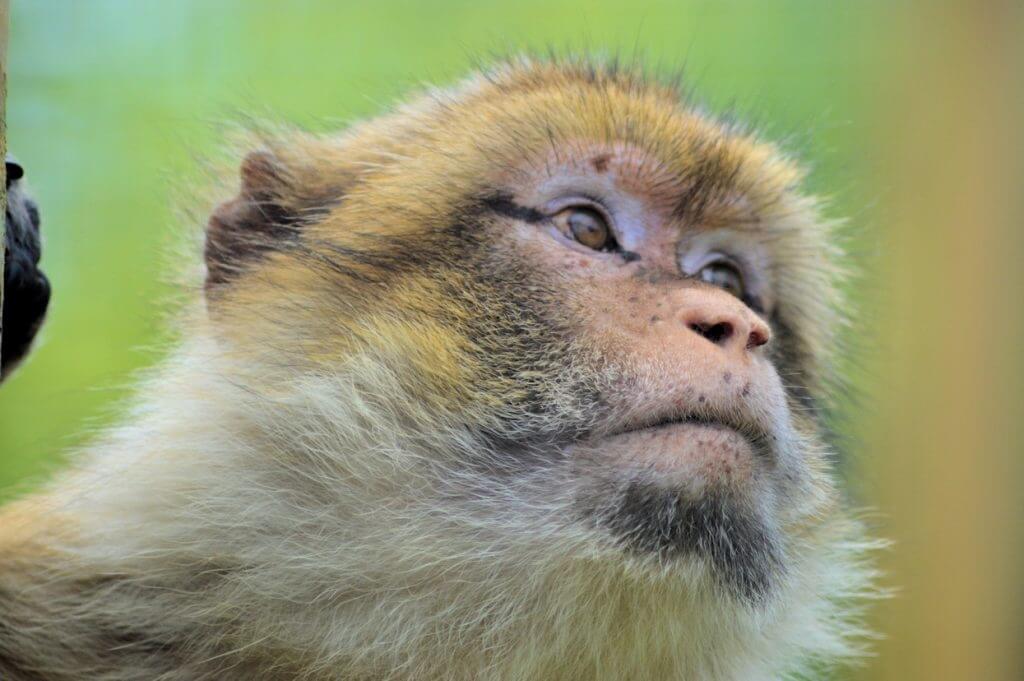
Live pet trade
It is estimated that approximately 300 infants are taken annually from the wild population in Morocco to be sold into the pet trade. Most of these youngsters will be sold internationally, however a minority are kept as pets in both Morocco and Algeria. Some of the macaques that remain in North Africa are then used as props for tourist photos.
This is where you can do your bit for conservation. If you are on holiday, please do not have your photo taken with a Barbary macaque. In doing so, you are fuelling this trade in infant Barbary macaques that have been forcibly removed from their families.
Conflict with humans
As humans begin to encroach into the macaques’ habitat, so problems arise. For example:
- Crop raiding – macaques raid local farmers’ fields in search of food. They are then shot by farmers defending their land and crops. A lot more research is required into this issue to establish the extent of the problem.
- Conflict over water – local shepherd tribes are beginning to graze their herds more and more in macaque habitat. In doing so, they block off previously open water sources in order to provision their herds, this leaves the macaques with no access to water.
BARBARY MACAQUES AT WINGHAM
Group of seven adults at Wingham Wildlife Park, one male and six females who have all come from Stichting AAP, an exotic animal rescue and rehabilitation centre in Almere, the Netherlands. The macaques all arrived from different sources, some taken out of the illegal pet trade, one was even found in a park in Paris.
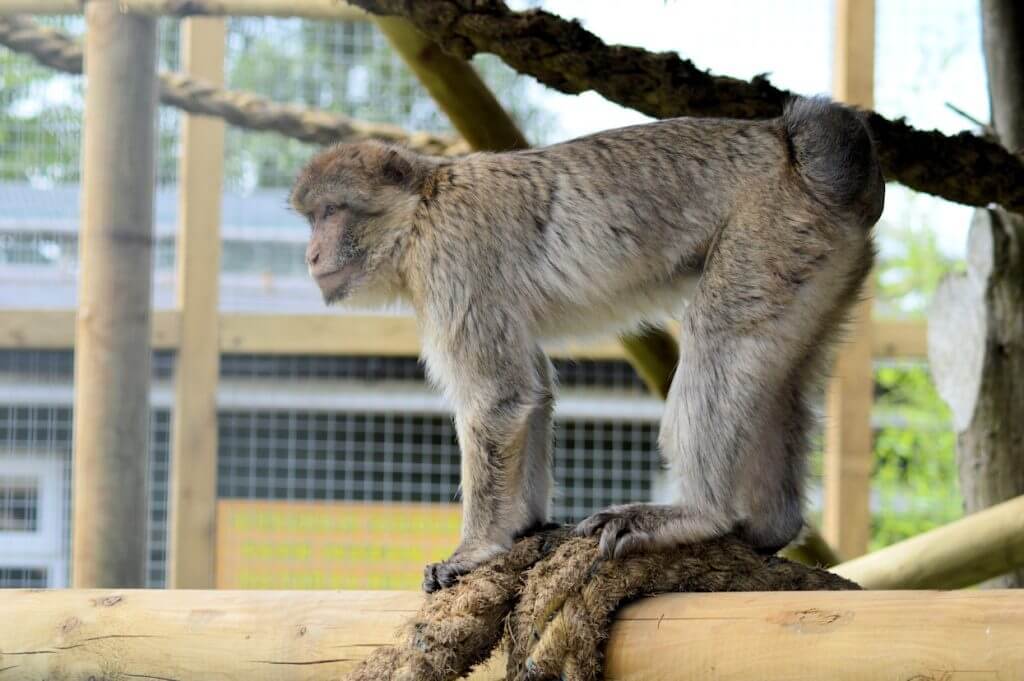
Some interesting links:
The above is intended to be a very brief introduction to Barbary macaques. The below links may be of interest to those wanting further information on macaques and some of the organisations mentioned above.
Barbary Macaque Awareness & Conservation
HM Government of Gibraltar – with some interesting pages on Gibraltar’s Barbary macaques
Gibraltar Ornithological & Natural History Society
